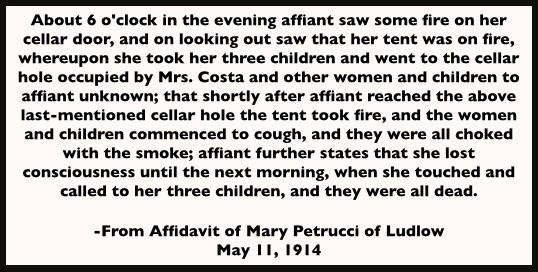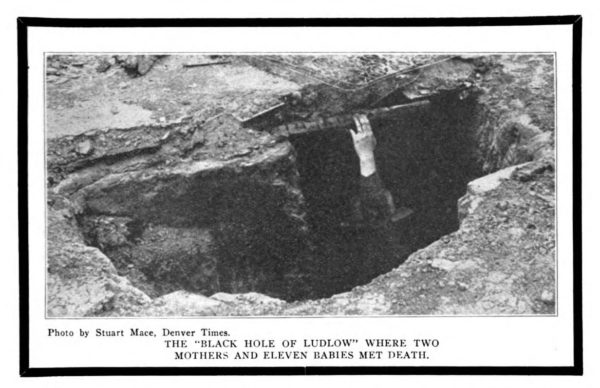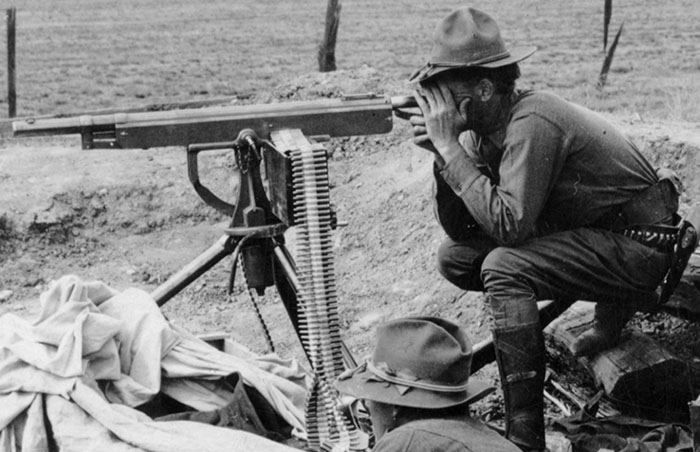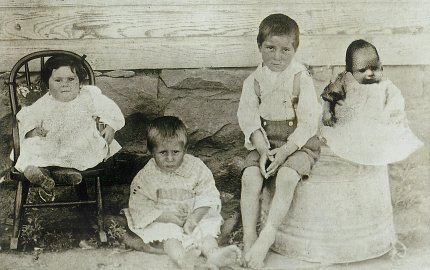
~~~~~~~~~~~~~~~~~~~~~~~~~~~~~~~~~~~~~~~~~~~~
Hellraisers Journal, Tuesday May 12, 1914
Trinidad, Colorado – The Affidavits of Mary Petrucci and Maggie Dominiske

———-
AFFIDAVIT.
State of Colorado, Las Animas County, ss:
Mary Petrucci, of lawful age, being first duly sworn, on oath testified as follows: That her name is Mary Petrucci; that affiant had started to wash, and a little later heard two bombs go off, and noticed the soldiers running toward the steel bridge, and they started to shoot down at the colony; affiant states that it was about 9 o’clock [April 20th]; and then affiant went into her cellar hole; that when affiant went into her cellar hole she took her three children, ages 4 years, 2 years, and 6 months, respectively; that affiant remained in the cellar until 6 o’clock in the evening, when her tent was set on fire; affiant states that her tent was the first one fired, as her tent was No. 1; affiant states that her tent was the tent nearest the railroad track; affiant states that when the shooting commenced with the machine guns the bullets were so thick in he tent that she shut her cellar door; that about 6 o’clock in the evening affiant saw some fire on her cellar door, and on looking out saw that her tent was on fire, whereupon she took her three children and went to the cellar hole occupied by Mrs. Costa and other women and children to affiant unknown; that shortly after affiant reached the above last-mentioned cellar hole the tent took fire, and the women and children commenced to cough, and they were all choked with the smoke; affiant further states that she lost consciousness until the next morning, when she touched and called to her three children, and they were all dead; affiant states that she went to the Ludlow station and came to Trinidad; affiant states that she does not remember anything of the trip from Ludlow to Trinidad; that affiant was taken sick with pneumonia caused by exposure and grief; affiant states that on account of being ill she never saw her three children after leaving them in the cellar hole; affiant states that when she came out of her cellar hole the guards were shooting after her, and she started to the cellar hole where Mrs. Costa was because it was dug in under like a mine, and affiant thought it would be safer, and the guards yelled, ” Get away from there”; affiant states that she had the three children, and she had nowhere else to go, so I went in there.
Further affiant saith not.
MARY PETRUCCI.
Subscribed and sworn to before me this 11th day of May, 1914,
[SEAL.]Leon V. Griswold, Notary Public.
My commission expires September 10. 1917.
[Emphasis added.]
———-
Machine Gun Pointed at the Ludlow Tent Colony,
Home to 1200 Men, Women and Children

———-
AFFIDAVIT.
[Mrs. Maggie Dominiske]I lived in Ludlow tent colony from September 25, 1913, until it was destroyed. We lived peacefully and happily together. We had no trouble whatever unless interfered with by guards or militia. On the day of October we observed an automobile passing. It stopped, one man got out of it, and a shot was fired into the tent colony. That shot passed right over my head. This started a battle which lasted a couple of hours, during which no one to my knowledge was hurt. I was not in Ludlow colony during battle which followed a couple of days afterwards. I do not know, of my own knowledge, what happened at that battle. After that we were not annoyed until some time in November. One Saturday, it being pay day at the colony, some ranchers came down for their pay. Mrs. Odell and I did not have lamp chimneys, so Mrs. Haddow and I decided to go to Cedar Hill, that being the nearest place we could purchase them. When we left the colony the men were lined up receiving their pay. When we got to the section house we saw about eight guards on horseback coming toward us and coming fast. I said to Mrs. Haddow, “I would not be surprised if there would not be a fight when we come back.” The guards always stationed themselves at the steel bridge, while fighting the union men, in order to protect themselves. To reach our homes, on our way back, we had to pass under this steel bridge. Before we got to the bridge on our return, two of our men, Italians, I think, told us to turn back, that the guards were shooting at them. Before we could turn the guards saw us, and began shooting toward us. We were compelled to go back to Cedar Hill and stay in the store until 9 o’clock, when the battle ceased until next morning. Our men, in order to protect us, always went to the hills, so when the guards started to shoot, our men had taken their guns and gone into the hills. The battle began again Sunday morning and lasted until afternoon, when word was received that the militia was coming. On Monday Dr. Lyons made a speech to the men, telling them to give up their guns to the militia. The miners gave up their guns. I do not know how this last battle started, for when I left our men were all in line ready to receive their pay.
Apparently the militia was all right. Some of them came to our dances. They were treated fine until they started searching our tent colony. Company K, when they came to search, treated us respectfully, but other companies treated us rotten. On the 31st of December, 1913. they came down to search, saying they were looking for guns. I told them we never have any guns in our house.
There was a company from Berwind, and six of this company came with their officers to my tent. He said to the men, “Tear up every damn board in the floor.” They tore it up, and soon the officer came by and said, “Has your tent been searched?” I told him “Yes,” and showed him were the boards had been torn up. I asked him if I could nail my floor down. He told me “Yes.” My husband just got my floor nailed down when he came back and had it torn up again. This continued until my floor had been torn up three times. He said to one of the fellows in Company K, “Did you go through this damn stove?” The soldier replied that he did not think ammunition would be put in a stove where they had fire. Nevertheless, he was made to search the stove. I had a tent where I had my furniture stored. They handled my pictures so roughly that all the glass was broken and mirror in my dresser smashed.
The last time they searched, their excuse was that they were looking for some one who had been shot, and after they got in the colony, they searched the tents. This time they went through cupboards, dresser drawers, trunks, examined mattresses, but destroyed nothing. After that everything went on all right until the 19th day of April. On that day we were having a ball game. Four of the militia on foot, and one on horseback came to our ball ground. The four on foot had rifles, which were pointed toward the crowd. The soldiers had attended the ball games before, but had never brought their rifles. I thought to myself, “They are going to try to start trouble,” but did not say anything. One of the men said to them, “You may watch the ball game, but it doesn’t need guarding.” The man on horseback then called to the man and told him he wanted to speak to him. The miner said he did not have time as he was playing ball. The soldier said, ” I’ll take you to the guardhouse and make you have time.” A number of us women stood by and jollied the soldiers. One woman said, “If we women would start after you with baby guns you would drop your rifles and run.” I turned around and laughed. He said, “Never mind, girlie, you have your big Sunday to-day, and to-morrow we will get the roast.” I did not answer, but laughed again. He said, “It would only take me and my four men to clean out this bunch.
Then we went home and everything was quiet. In the evening we went to a dance. My husband came in and told me I had better go home, because those four men had come down to the tent colony and were trying to start trouble, but nothing happened until next morning, April 20, when a little after 8 o’clock I went up to Mrs. Jolly. She, Louis Tikas, and I were looking at some pictures that we had taken of our Easter Sunday ceremonies, when some one came in and told him that there were four militiamen there to see him. When he went out a soldier handed him a piece of paper with a man’s name who was not in the tent colony. Tikas asked him who gave him authority to get this man, and did he get his authority from the civil authorities. The soldier told him no; he got it from the military authorities. Tikas told him that he understood that the military authorities in Las Animas County was out of commission. The soldier then said: “If you don’t produce this man by afternoon, we will search the tent colony. “Tikas then asked if Maj. Hamrock was up at the military camp. The soldier said, “Yes.” Tikas told the soldier he would like to speak to Maj. Hamrock. Then they went away, the spokesman saying in a mean manner: “All right, we’ll be back again.” We went back to Mrs. Jolly’s house to get the pictures I was looking at. I went home, put them in an envelope, and had them all ready to send when someone called: “Look out for trouble; the militia is coming.” My children had just got out of bed, and were not all dressed. I ran out to see if the militia was coming. When I got out I met Mrs. Thomas, who said: “We had better take our children and go to the pump station, for I think there is going to be trouble.” I did not think myself that there would be, but I told her to take my children, and if anything did happen they would be there. I then went over to where my husband was, in front of the tent colony, when I saw Tikas running toward the colony waiving a white handkerchief, and when he was near the tent colony one bomb was fired. Before the second was fired he was in the tent colony and the machine guns began firing. On hearing the bombs our men started toward the D. & R. G. tracks on their way to the sand hills to lead the fight away from the tent colony. As Mr. Costa went by me I said: “Charlie, be careful, the soldiers are all around those hills.” He said: “We must lead the fight away from the colony, or those machine guns will kill every woman and child in here.” My husband told me to run to the children. I ran to the pump station and got in the barn. I stayed there until 7 o’clock at night.
From about 10 until about 5 o’clock shooting was almost continuous, not ceasing more than from three to five minutes. From about 3 to about 5 o’clock the bullets around us rained like hailstones, several of the bullets passing through the barn where we were hiding. I can not be sure of the time, but I should judge it to be about 6 when I first saw the tents burning. Mr. Barton said our only hope of escape would be if a train should come by. About an hour after a freight train came by, and I, with my children and about 14 others, I think, started for the arroyo. After we came out of the barn I looked to see if I could see any of the militia, and saw four standing behind a barn above us. As I stopped to get under the fence, two shots were fired at me, and missed me by about 2 feet, striking at the feet of a woman with a little baby in her arms. I laid still several minutes fearing to move. The woman fainted, and her baby fell. I can not remember how I got this woman, her baby, and my children into the arroyo. I remember seeing a dead man. I had heard him with others singing “The union forever,” after he was shot in the afternoon. We went from the arroyo to Baye’s ranch, and stayed one hour. It was not safe there, so we went to another ranch about 6 miles from there. We got a wagon from Mr. Bayes, put the old women and children in the wagon and the rest of us walked to this ranch, arriving about midnight. About 9 next morning Mrs. Thomas and I started to the Black Hills, a distance of about 6 miles, to secure water for the men. When we got at the foot of the Black Hills we met 10 Greek boys, who told us they had taken the men water so we need not go farther. We met a man in a wagon who took us back to the ranch. Later in the afternoon he brought us to Trinidad. I did not have on sufficient clothing when attacked, and my children were barefooted, not being fully dressed. I lost all of my possessions in the Ludlow battle.
MRS. MAGGIE DOMINISKE.
Subscribed and sworn to before me this 11th day of May, A. D. 1914.
[SEAL.]Leon V. Griswold, Notary Public.
My commission expires September 10, 1917.
[Emphasis added.]
~~~~~~~~~~~~~~~~~~~~~~
SOURCE
Final Report and Testimony Submitted to Congress
-by the Commission on Industrial Relations
Created by the Act of August 23, 1912
(Sometimes referred to in the press of the day
as the “Senate Investigation”)
WDC, 1916
Volume 8: 6999-8014
https://books.google.com/books?id=0-keAQAAMAAJ
7376-Petrucci
https://play.google.com/books/reader?id=0-keAQAAMAAJ&printsec=frontcover&pg=GBS.PA7376
7379-Dominiske
https://play.google.com/books/reader?id=0-keAQAAMAAJ&printsec=frontcover&pg=GBS.PA7379
IMAGES
Black Hole of Ludlow
http://john-adcock.blogspot.com/2012/06/rogues-gallery-socialist-cartoons.html
Machine Gun Pointed at the Ludlow Tent Colony,
Home to 1200 Men, Women and Children
https://www.du.edu/ludlow/gall2b.html
Petrucci Children
http://www.cpr.org/news/story/descendants-recount-ludlow-massacre-100-years-later
(Little Bernard died a few months before the Massacre, after guards refused to allow Mary to take her sick child into Trinidad to see a doctor, see story at link above.)

WE NEVER FORGET
Frank Petrucci-6 months
Lucy Petrucci-2
Joe Petrucci-4
Bernard Petrucci-6
~~~~~~~~~~~~~~~~~~~~~~~~~~~~~~~~~~~~~~~~~~~~
Signore Delle Cime con Silenzio – Coro Alpini
